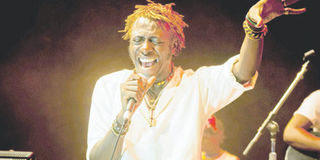Sarabi ghetto boys hitting high notes

The band's lead singer Nelson Mandela.
What you need to know:
The audience on that evening was worked up as the Afro fusion band gave them a feel of their heart warming hits in a performance that lasted about an hour.
The first time I watched a Sarabi Band performance was at the 12th edition of the Sauti za Busara Festival early this year at Ngome Kongwe, Zanzibar.
The audience on that evening was worked up as the Afro fusion band gave them a feel of their heart warming hits in a performance that lasted about an hour.
They seemed to strike chemistry with the audience that kept singing along to some of their tunes.
Though there is not much talk about them in their home land, they are undoubtedly on their way to becoming the most internationally recognised Kenyan band.
Apart from performing to a large audience at the Busara Music festival, during their European tour in June, they performed before 40,000 fans at the Africa Oyé Festival in the United Kingdom and at the Salem Festival in Ethiopia.
This was followed by their participation in the Roskilde Festival in Denmark, the biggest music festival in northern Europe
In an industry where band members rarely stick together for long, these young men have now been together for 11 years.
Their history can be traced from the first day they met at the Haba na Haba Art Centre in Nairobi Kenya.
Without the Haba na Haba art Centre founded by Sarabi’s manager George Ndiritu in 1998, these careers would have been wasted due to the absence of music and arts education in schools.
The centre provides children and youth with free practical performing arts classes for those with an interest in music and then later different bands are formed after the training.
Originally known as Sauti za Kikwetu, Sarabi has grown from a small band made up of youngsters from Nairobi slums into a mature group. Their music addresses societal issues. For instance their hit, Sheria, a collaboration with Juliani, stresses the importance of applying the law equally to everyone.
The eight-member group that includes Christabel “Bella” Were, Antony Kimangu, Nelson Mandela, Peter Mbau, John Nyamai, Bernard Oduor, Haron Waceke and Adam Mwadama getting recognition abroad.
Sharing their musical journey with The Beat during the 2015 Karibu Music Festival, they said, their message to the audience is always very simple; social justice and love for all.
“As human beings we live in a world where racism, classification and many other problems of all sorts affect us in our daily lives as people are conciously ignorant, they know something is wrong and they have a chance to help one another but since he is okay she does not care to help,” say Nelson Mandela the band’s lead singer.
Sarabi write their songs in a way that preach about dignity while helping one another because they depend on one another.
War and confilct issues are also part of their message to push for peaceful resolutions to conflicts occuring in different countries.
Haron Waceke, is the band’s basest, he owes their success to their background which he says was one of the most unpleasant places where it is never easy for one to succeed without working extra hard.
“What makes us sing more about social justice is because we came from a place full of problems and challenges. A place where there is too much religion but no love, so love is the religion,” says Waceke.
Vocalist Christabel ‘Bella’ Were is the only female in the group. To her, respect among band members is the most beautiful thing she has experienced while working for the past two years.
The band, in 2013 released their first album, titled ‘Oyaore’, and in 2014 the band did a collaboration ‘Sheria’ with Juliani.
“’Sheria’ looks back at the maize scandal, the missing free primary education money, the ‘Kazi kwa Vijana’ scandal and more. But the song also blames Kenyans for accepting bribes and bribing when it is convenient to do so,” says Waceke.
Their depiction of the Kenyan society in the song saw the hit ranked ninth among 20 best African songs in the Jusi I Love chat, with the group getting their first nomination in the Honesty Oscar Awards last year.
“Meanwhile, Sio Lazima is about restraining oneself from acts that could be harmful to society, while the track, Love, brings a bit of romance into the mix,” explains Mandela.
It is this blend that they insist gives them an edge over other musicians in the country.
The band has four recordings which are Sheria (single), 2014; Oyaore (album), 2013, Suluhisho (single), 2013; Toto Africa (single), 2012.
This year Sarabi was engaged in a country wide project called Jukumu Letu, to increase interest and understanding, the Kenyan constitution amongst the youth, through the use of music. And the band was recently appointed Kenyan ambassadors for AAPI (African Arts Peace Initiative).
The band is also in the process of making a documentary film about SARABI titled Music is our weapon.
“ It is a film about power of music as a tool for social change, which is a philosophy that Sarabi lives by,” says their manager.
Their social engagement extends to their own neighbourhoods. They teach children from the informal settlement of Kibera. To mentoring children in the ghetto or the humble kingdom as they call it. “As for AAPI ambassadors, the band is requested to advocate peace, and perform whenever there is an event organized by AAPI for free. Sarabi already speaks about issues that they raise and were the natural choice,” added Thomas Menzer.
Peter Mbau the Sarabi guitarist says, the film will also show Sarabi’s journey to the world and the movie will be a great benefit to the entire band and it will also insipire other up-and-coming musicians and bands all over the world.




